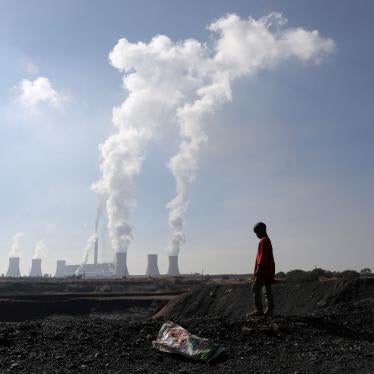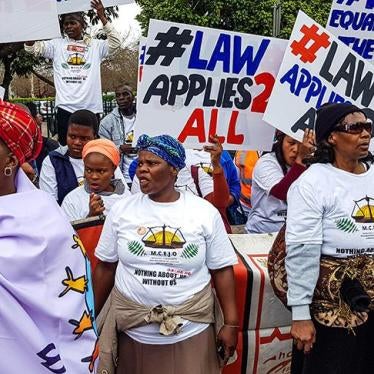The South African Human Rights Commission has released a scathing report on the damage mining in the country is posing to human rights. The conclusion paints a dark picture: "[T]he mining sector is riddled with challenges related to land, housing, water, [and] the environment."
What's more, the commission found that the government is responsible for the harm done to mining-affected communities because of its "failure to monitor compliance, poor enforcement, and a severe lack of coordination."
When I interviewed residents of such communities in South Africa's Limpopo, KwaZulu Natal, Mpumalanga, and North West provinces earlier this year, I heard many stories echoing the commission's findings.
Somkhele is a community near one of the coal mines mentioned in the Human Rights Commission's report. Two weeks ago, I spoke with Wandile, a 67-year-old woman who grew up in the area and who was forced by the mine to relocate. I have changed her name for her protection.
"There are so many problems we don't even know where to start," she said. "We used to have land for farming… but the mine took it away and we did not get any compensation for that."
The mining company, Tendele Coal, has said on several occasions that while it compensates for houses and other belongings, it is prevented from paying the villagers for the land when they are evicted because the land is owned by the Ingonyama Trust Board, a traditional body mandated to hold land for communities.
The Human Rights Commission said that this practice of not paying compensation for land is "below what is considered to be appropriate in terms of global industry standards," citing standards of the International Finance Corporation, a World Bank institution that encourages private sector investment in developing countries .
Mining-affected communities across South Africa have said that mining needs to respect the customary rights of the people who have lived on the land for generations, even if they do not have a formal land title.
When Wandile showed me around her new home, built by the company in an area about 1,000 meters from the mine, she pointed to an area where coal dust was visible in the air during operations: "Our kids get sick. They have respiratory illnesses and asthma. When we harvest rain water it is polluted with dust."
The company says that it carries out continuous air pollution monitoring. The report of the Human Rights Commission found concerns about air quality, dust control, and blasting in many communities. It criticizes the lack of regulation around blasting operations and urges the government to enforce air quality standards.
On August 24, the Pietermaritzburg High Court presided over a case on related concerns. Members of the Somkhele community, under the banner of the Mfolozi Community Environmental Justice Network, and the Global Environment Trust argued that Tendele Coal's current operations are unlawful because the company didn't obtain the needed environmental and land use licenses. The community members have also asked the court to order the government to halt the mining operations to protect their constitutional right to a healthy environment.
In its response to the court, the company said that there is "no basis for these claims." A judgment from the court is expected in about three months.
The Human Rights Commission has made it clear that its recommendations and directives to the government to monitor the rights impacts of mining operations are mandatory. Relevant branches of government are required to provide a detailed written report on what action they have taken to the commission in six months, and again in 12 months.
Wandile and many other residents in mining-affected communities have high hopes that their government will finally take concrete steps to protect their rights, including that to a healthy environment.
Katharina Rall is an environment researcher at Human Rights Watch.








